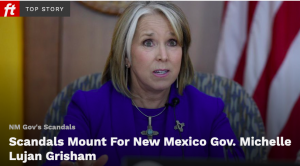Several years ago the hardtracking staff did a segment on NPR’s Here & Now about political operatives tricking out partisan websites to look like local news sources.
The opening of the segment went like this.
ANCHOR: OVER THE PAST FEW MONTHS WE’VE BEEN LEARNING THAT FAKE NEWS IS NOT THE EXCLUSIVE PROVINCE OF MACEDONIAN TEENAGERS AND RUSSIAN HACKERS. FROM THE REPUBLICAN GOVERNORS ASSOCIATION TO DEVIN NUNES, POLITICIANS AND POLITICAL GROUPS HAVE BEGUN CREATING A PARELLEL UNIVERSE OF WEBSITES WHERE THE NEWS IS ALWAYS GOOD FOR THEM – AND BAD FOR THEIR OPPONENTS. JOINING US FOR A REALITY CHECK IS HERE & NOW MEDIA ANALYST JOHN CARROLL. LET’S START WITH CALIFORNIA CONGRESSMAN DEVIN NUNES – WHAT’S HIS ROLE HERE?
Nunes – who’s also the House Intelligence Committee Chairman – started this website called The California Republican, which is listed on Facebook as a “media/news company” but really just produces GOP propaganda like the piece headlined “Understanding the process behind #ReleaseTheMemo.” It’s a marketing tool paid for by Nunes’s campaign committee – something that’s only disclosed in extremely small type at the bottom of the homepage.
I’M LOOKING AT THE FREE TELEGRAPH WHICH IS PRODUCED BY THE REPUBLICAN GOVERNORS ASSOCIATION, AND THERE’S NO DISCLOSURE ON THE HOME PAGE AT ALL.
There used to be one there, but they recently moved it to the bottom of individual story pages. An RGA spokesman told Politico that it “makes it the most clear to have it on each individual article. The large majority of clicks on the Free Telegraph website are on direct articles, not the main page.” Then again, the number of readers who get through entire articles is undoubtedly much smaller.
(Housekeeping note: The California Republican is gone now; The Free Telegraph is still going.)
The segment also covered examples of sleight-of-news on the state level. Asked why so many faux sites were springing up just then, we offered this: “It’s symptomatic of the parallel information universes that have emerged on opposite ends of the ideological spectrum. It’s also a function of confirmation bias – people go to the Internet not for information, but for validation.”
In the intervening years, lots more agitprop in sheep’s clothing has surfaced, as Elahe Izadi reported last week in the Washington Post.
The most extreme examples include outfits such as Metric Media — a national network of 1,300 sites that have the look and feel of local news outfits. They cover city councils and schools under innocuous-sounding banners such as “Illinois Valley Times” and the “Lansing Sun.” But a New York Times investigation last year reported that their stories were essentially propaganda, partially funded and directed by PR firms and conservative political groups in support of Republican candidates. (A company executive later called the report “patently absurd.”)
It was a different outfit, however, that triggered the Post story.
Yet a closer look suggests the site is not always the independent crusader it appears to be. When it investigated the hotel industry, it was after it had received a grant from Airbnb. A high-profile investigation into Arizona utility regulators came after Checks and Balances received money from a solar power company, the company disclosed in 2015.
And there’s more . . .
Now Checks and Balances is investigating a massive hospital system in Virginia named Sentara, publishing regular stories and asking
patients and employees to send tips that might reveal how the nonprofit hospital “piled up $6 billion in liquid assets,” among other issues.
These stories started appearing the same month that a medical school in a complex dispute with Sentara hired a public relations firm that happens to share a founder and financial ties with Checks and Balances.
The executive director of Checks and Balances said that its funding sources do not influence the course of its investigations. In the case of Sentara, he said the site’s two-person staff chose to cover a powerful institution that has largely been overlooked by mainstream media.
Right – just a coincidence. Beyond that, “the PR firm and medical school said the payments between them did not fund the website’s investigations into the hospital chain.”
Uh-huh. Not surprisingly, the tale gets even more tangled from there.
As the Post story indicates, that sort of pretend journalism has become a staple of the stealth marketing playbook. The problem is, for every one of the sneak adtacks that gets called out, there are untold others that trick an unsuspecting public.
No checks and balances, so to speak.
John R. Carroll is media analyst for NPR's Here & Now and senior news analyst for WBUR in Boston. He also writes at Campaign Outsider and It's Good to Live in a Two-Daily Town.
John R. Carroll has 305 post(s) on Sneak Adtack
